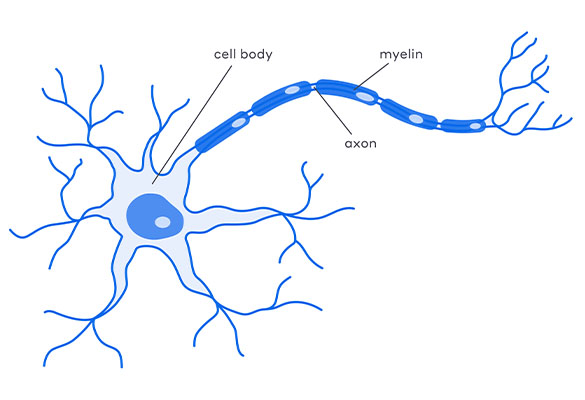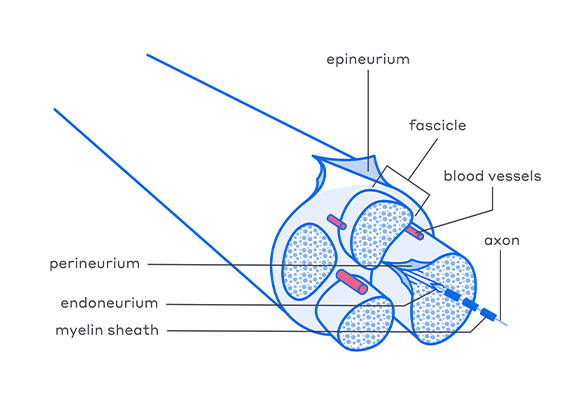frequently asked questions
Our frequently asked questions explain what peripheral nerves are, what they do, how they can be damaged and what options exist to repair them.
Your nervous system is divided into two parts—the central nervous system (the brain and spinal cord) and the peripheral nervous system. The central nervous system sends and receives signals, while the peripheral nervous system carries messages to and from the rest of your body to the spinal cord, giving you the ability to move, feel, touch and more.
Peripheral nerves are made up of axons, or nerve fibers, which act like wires to carry signals to and from your spinal cord throughout your entire body. There are both sensory and motor nerves and sometimes a nerve will be both sensory and motor. Sensory nerves allow you to feel things like heat, pain and vibrations. Motor nerves tell your muscles to move and allow you to take action in response to your environment. Potential signs of peripheral nerve damage include loss of feeling or numbness in an area or inability to move a part of your body, or sometimes chronic pain.
is every type of nerve damage treatable with surgery?
Many types of peripheral nerve damage can be addressed by surgical nerve repair, but the sooner the better. There are some types of nerve damage that are more generalized, like fibromyalgia or general neuropathy (meaning one specific location of damage cannot be isolated or identified). In cases like these, surgical nerve repair may not be a good option. You will need to consult with a physician who specializes in nerve repair for options related to your specific type of injury or nerve damage.
could nerve damage be causing my symptoms?
Think back to when your symptoms first started—was it after a traumatic accident, perhaps a kitchen-related injury or even after a surgical procedure? Pain, numbness or a loss of function (motor) lasting more than three months, may indicate that nerve damage is to blame and you should seek the help of a nerve specialist.
what does chronic pain caused by a damaged or injured nerve feel like?
Pain is different for everyone. Some complain of tingling, numbness or pain all over. Others describe it as “pins and needles,” sharp spasms, a burning sensation, or extreme sensitivity to touch or heat and cold. It may be constant or intermittent. For more information about the chronic pain caused by nerve damage, please visit rethink-pain.com.
how is nerve damage diagnosed?
Doctors use a combination of tools to identify and diagnose nerve damage. This includes:
- Taking a comprehensive medical history, recording any previous surgeries, accidents or injuries you may have had in the past
- Performing a physical examination at the location of the suspected injury
- Performing diagnostic tests such as nerve block injections, nerve conduction tests, or imaging through ultrasound or MRI
When you visit the doctor, describe your symptoms in as much detail as possible. When did your symptoms start? What are you unable to do? What does it feel like (numb, tingling, hot, stabbing)? What triggers your symptoms? Are you having any weakness? This will help your doctor make the most accurate diagnosis possible.
who are peripheral nerve surgeons and what do they do?
There is no one job title or role that aligns precisely with the specialty of nerve surgery. Instead, there are many types of doctors who specialize in nerve repair and whose expertise qualifies them as peripheral nerve surgeons. These doctors undergo extensive microsurgical training to become experts in their field.
The most common medical professionals who perform nerve surgery are:
- Reconstructive plastic surgeons: With extensive microsurgical training, reconstructive plastic surgeons regularly perform nerve repair
- Orthopedic surgeons: As doctors who specialize in the musculoskeletal system, orthopedic surgeons focus on muscles, bones, joints and nerves. Some orthopedic surgeons have made nerve repair a primary focus
- Hand Surgeons: Hand surgeons can be orthopedic or plastic surgeons that have completed additional training in hand, wrist and upper extremity. A major part of hand surgery is focused on nerves
- Similar to hand surgeons, microsurgeons may come from different specialties and complete additional specialization in the use of microscopes and instruments used to repair small structures like nerves and vessels.
- Doctors of podiatric medicine (DPMs): a small number of DPMs undergo microsurgical training to be able to perform nerve surgery in the feet and lower legs
- Neurosurgeons: many neurosurgeons are mostly focused on the central nervous system (the brain and spinal cord), but some specialize in working on the peripheral nervous system (the nerves running all through the body)
- Oral Maxillofacial Surgeons (OMFS): These surgeons received their medical degree in dental or medical school and then specialize in surgery of the hard and soft tissues of the head, jaw and neck. Some OMFS further specialize in microsurgery and nerve repair.
- Otolaryngologists or Ear, Nose, and Throat (ENT) Surgeons: As the name implies, ENT surgeons are focused on surgery in and around the ear, nose throat and other structures of the head and neck. Some are also skilled in performing nerve repair on injuries sustained to nerves in the face or jaw.
Not every medical professional with a title similar to those listed above specializes in nerve repair. But every surgeon listed in our locator tool does.
Looking for a surgeon who specializes in nerve repair? Try our Find a Surgeon tool.
what should I do if I had my wisdom teeth removed—or another dental surgery—and my tongue or part of my face is numb?
A trigeminal nerve injury can occur during many oral-surgical and dental procedures. The most common causes include dental implants, wisdom teeth removal, root canal procedures, and even local anesthetic (numbing) injections. Even in a perfectly performed procedure, a nerve injury may occur, despite the doctor providing the highest level of care. While some injuries will heal on their own, others may require surgical nerve repair. Repair of these injuries is possible, but the sooner you seek the help of a nerve repair specialist the better.
The trigeminal nerve has three branches, but the two areas that are most commonly injured are the inferior alveolar nerve, which provides feeling in your lip and chin area, and the lingual nerve, which is responsible for providing feeling in your tongue.
Trigeminal nerve injuries can significantly impact your quality of life, both physically and emotionally. Simple everyday activities like eating, drinking or brushing your teeth can become a challenge. If you are experiencing a loss or decrease in sensation in your lip, jaw, chin, cheek or tongue, or persistent pain in any of those areas, it is possible you have suffered a nerve injury.
Visit our surgeon locator to find a nerve repair surgeon specialized in this type of repair.
how could surgical nerve repair potentially help if I’ve had an amputation and now have constant pain?
During an amputation, nerves are cut and can potentially be left unrepaired, which can lead to a neuroma (a tangled mass of nerve and scar tissue) forming at the end of the cut nerve. Pain at an amputation site may be neuroma pain. Not all neuromas are painful, but when they are the pain can be debilitating.
how does nerve damage after a mastectomy lead to numbness?
There are sensory nerves in your breast that send signals through the spinal cord to the brain. These signals allow you to feel touch, temperature—even pain. But these nerves need to be cut during a mastectomy so the breast tissue can be removed.
If the nerves aren’t repaired during breast reconstruction, they no longer send signals. No signal means no sensation and the chest area may be left permanently numb.
To learn more about breast nerve repair and the opportunity to regain sensation after a mastectomy, please visit resensation.com, our site specifically designed to help patients who may be experiencing numbness after a mastectomy.
is this procedure covered by insurance?
Nerve repair is generally a covered procedure, but you should always check your insurance policy since coverage may vary.
will this type of surgical procedure require a hospital stay?
Your surgeon will work with you to determine your needs based on your specific case. However, many nerve repair procedures can be done on an outpatient basis. Speak to your surgeon to understand your options.
what can I expect after my nerve procedure?
Reduction or elimination of pain can be almost immediate. However, if your nerve is reconstructed, return of sensation or nerve function takes time and can feel a little strange. You may feel some small zings and zaps as your nerve starts to heal, but that may be good news and a sign that your nerve is starting to work again.
You might notice the following sensations during the first six months after surgery, but they typically go away within 12 months:
- Hot or cold sensations and sensitivity
- Little shocks or zaps
- Aching or tingling feelings
If your pain persists or there is no return of nerve function, you should consult your surgeon.
why does recovery from a nerve injury take so long?
Nerve injuries often require you to be a very patient patient. With proper and timely repair, it is possible for peripheral nerves to regenerate and for function to return, but nerve regeneration can be slower than you would like and surgically repairing the nerve is just the first step. The goal of nerve repair is to reestablish the necessary structure or provide the appropriate environment your nerve needs to regenerate correctly. Afterwards, your body needs time for the nerve fibers (axons) to regrow in order for function to return. Nerves regenerate at a rate of about 1 mm per day and must regrow from the area of injury all the way to the muscle or sensory area/skin area that was affected. For example, if you injure your hand, it may take 5 or 6 months after the nerve repair for the feeling to return in your finger.
To help keep yourself motivated, consider taking video of your progress every few weeks. Day to day the changes may be harder to recognize, but over time your progress may become more noticeable. Patients often speak of the excitement they felt the first time they were able to open a jar by themselves again, feel the touch of their child grabbing their hand, or even feel a bit of pain again in an area that was previously numb. Documenting these moments can really help track your progress.
During your recovery period, be sure to make follow-up appointments with your treatment team a priority so they can track your progress, help you understand what to expect, and make adjustments to your recovery plan as needed.
what are the risks of surgical nerve repair?
Surgeons have been successfully repairing nerve injuries and nerve damage all over the body for years, and there are numerous clinical studies on the technologies they use. Nerve repair is a common procedure, but should be done by a specialist trained in microsurgical nerve repair.
how have nerve repair options improved over time?
In the past, surgical options for repairing nerves were limited and had variable rates of success in alleviating nerve pain or restoring function. Surgical techniques for nerve repair have evolved immensely over the last 20–30 years, and more options for different types of repair are much more available and have now been widely clinically studied.

could I have nerve damage
Explore how nerve damage can happen and learn about how different nerves work throughout the body.


